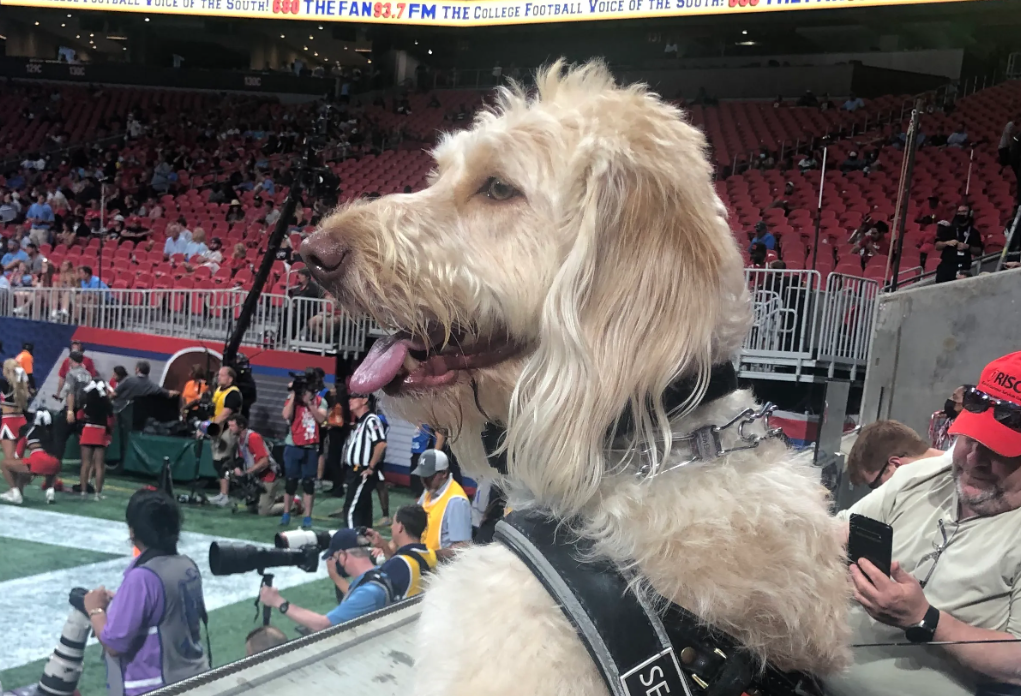Attending sporting events is a popular pastime that brings excitement and joy to many people. However, for individuals with disabilities, navigating the challenges of crowded stadiums, loud noises, and complex environments can be daunting. Service dogs play a crucial role in providing assistance and support, enabling their handlers to enjoy these events with greater ease and confidence.
Access and Navigation
One of the primary benefits of having a service dog at a sporting event is the assistance they provide in accessing and navigating the venue. Crowded stadiums can be overwhelming, and service dogs are trained to help their handlers find their seats, avoid obstacles, and move through crowds safely. This is particularly important for individuals with visual impairments, mobility challenges, or other disabilities that make navigating large, busy spaces difficult.
Emotional Support and Anxiety Reduction
Sporting events can be loud and chaotic, which can trigger anxiety or stress for some individuals. Service dogs offer emotional support, providing a calming presence that helps mitigate anxiety. For those with conditions such as PTSD, autism, or severe anxiety, the presence of a service dog can make the difference between attending an event and staying home.
Medical Assistance
Service dogs are trained to perform specific tasks that can be lifesaving in emergency situations. For individuals with medical conditions such as diabetes, epilepsy, or severe allergies, service dogs can detect changes in their handler’s condition and alert them before a crisis occurs. At a sporting event, this early detection can prevent medical emergencies and ensure that the handler receives prompt medical attention if needed.
Enhanced Independence
Attending a sporting event with a service dog enhances the handler’s independence. Instead of relying on friends, family, or event staff for assistance, individuals with disabilities can rely on their service dogs to provide the support they need. This fosters a greater sense of autonomy and self-confidence, allowing them to participate more fully in the event.
Legal Rights and Accessibility
Under the Americans with Disabilities Act (ADA), service dogs are granted access to all public places, including sporting events. This means that handlers have the right to bring their service dogs into stadiums and arenas without facing discrimination. Event organizers are required to accommodate service dogs, ensuring that individuals with disabilities have equal access to the enjoyment of the event.
Tips for Attending Sporting Events with a Service Dog
Plan Ahead: Before attending the event, check the venue’s policies regarding service dogs. Ensure that the staff is aware of your service dog and any specific needs you may have.
Stay Calm: Sporting events can be overwhelming, so it’s important to remain calm and composed. Your service dog will look to you for cues, so maintaining a relaxed demeanor will help them stay focused on their tasks.
Bring Essentials: Pack necessary items for your service dog, such as water, snacks, and waste disposal bags. Ensure that your dog has a comfortable place to rest during the event.
Advocate for Your Rights: If you encounter any issues or resistance from event staff, calmly assert your rights under the ADA. Be prepared to provide information about your service dog’s role and the legal protections that apply.
In conclusion, service dogs provide invaluable support to individuals with disabilities, enabling them to enjoy the excitement and camaraderie of sporting events. By offering assistance with navigation, emotional support, medical alerts, and enhanced independence, service dogs make it possible for their handlers to participate fully and safely in these events. Understanding the legal rights and practical considerations involved ensures a positive and inclusive experience for all attendees.

